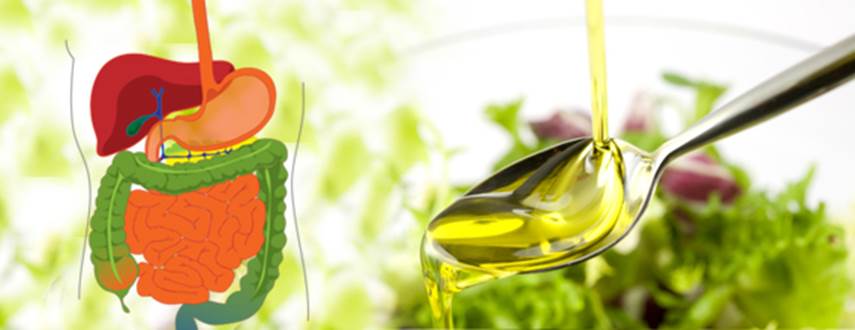
Studies published by the OHIS (Olive Health Information System in partnership with the University of Navarra School of Medicine) confirm that as soon as we eat olive oil it has a number of effects all the way along the digestive system. As far back as ancient times, it was recommended for assorted digestive disorders, and its beneficial properties are now being corroborated by epidemiological studies and a wealth of scientific data.
When olive oil reaches the stomach it does not reduce the tone of the muscular ring or sphincter at the base of the oesophagus. Because of this, it reduces the risk of the flow or reflux of food and gastric juice up from the stomach to the oesophagus.
Olive oil also partially inhibits gastric motility. As a result, the gastric content of the stomach is released more slowly and gradually into the duodenum, giving a greater sensation of "fullness", and favouring the digestion and absorption of nutrients in the intestine.
One of the effects of olive oil on the hepato-biliary system is that it is a cholagogue, ensuring optimal bile drainage and full emptying of the gall bladder. Another effect is that it is cholecystokinetic, i.e. it stimulates the contraction of the gall bladder, which is extremely helpful in the treatment and prevention of disorders of the bile ducts. It stimulates the synthesis of bile salts in the liver and increases the amount of cholesterol excreted by the liver.
In short, owing to its beneficial effect on the muscle tone and activity of the gall bladder, olive oil stimulates the digestion of lipids, because they are emulsified by the bile, and it prevents the onset of gallstones.
When consumed, olive oil produces a small amount of secretion by the pancreas, making this organ "work" little, but efficiently and enough to carry out all its digestive functions. Olive oil is recommended in diseases where pancreatic function has to be maintained, such as pancreas failure, chronic pancreatitis, cystic fibrosis, malabsorption syndromes, etc.
Owing to the sitosterol it contains, olive oil partially prevents cholesterol absorption by the small intestine. It also stimulates the absorption of various nutrients (calcium, iron, magnesium, etc.).
Olive oil, therefore, is a fat that is digested and absorbed really well. It has excellent properties and a mild laxative effect that helps to combat constipation and bad breath.